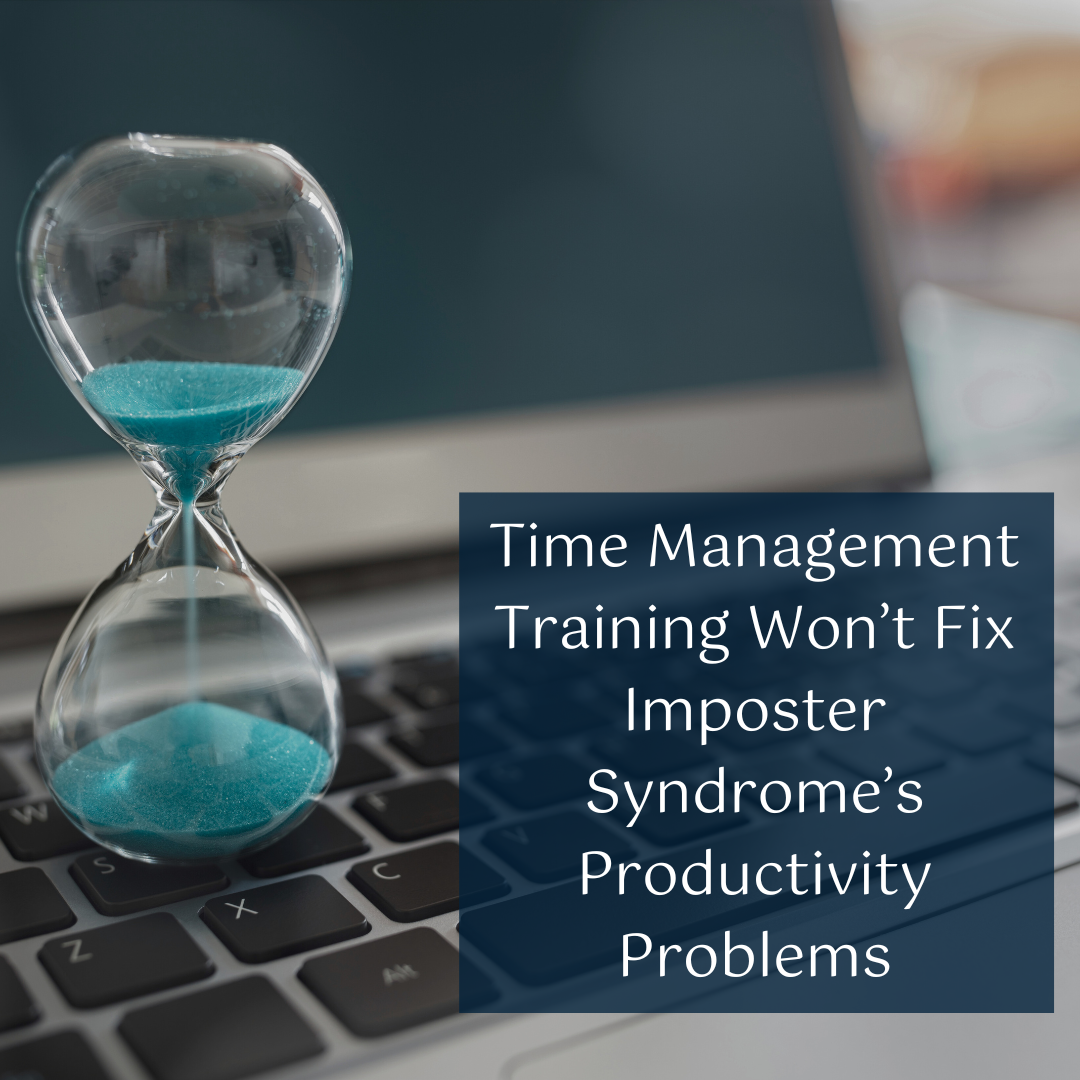Productivity: how can you spot which of your team members might be struggling with Imposter Syndrome, to an extent that is harming their productivity, and prevent it?
The 2024 Imposter Syndrome Research Study (white paper here) found that 62%, nearly two thirds, of people are struggling with Imposter Syndrome daily or regularly, to an extent that is harming their productivity. And for 34% the effect is 'severe', based on their actions, thoughts and emotions, from the study.
Procrastinating, due to Imposter Syndrome, multiple times a day.
Stuck in 'freeze', avoiding important projects, which trigger Imposter Syndrome
Stuck in negative thinking, harming their work output
Source © Clare Josa 2024 Imposter Syndrome Research Study
So many of the coping strategies that people use to handle Imposter Syndrome harm their productivity.
Those with severe Imposter Syndrome (34%) describe a 2-hour report taking 2 days, due to over-thinking, and second-guessing how it will be received.
The coping strategy of perfectionism is causing them to over-prepare, from fear that even the tiniest mistake could lead to them being 'found out' as 'not good enough'. This leads to significantly reduced output, or burnout-inducing overtime levels.
Decision paralysis can lead to them avoiding important projects, until they can use the stress and adrenaline of the deadline to push on through the fear (47%). And going to their line manager for reassurance on seemingly simple decisions is harming the manager's productivity.
And one third of your team members are at high risk of burning out in the near future.
This is all running under the surface, silently and well-hidden, playing a much larger role in productivity and efficiency than any skills you could learn on a time management training course.

And for one in ten of them, Imposter Syndrome is so severe that it's causing them to think about quitting their job today. Someone in that state of mind is going to really struggle to perform productively.
No amount of time management training or productivity apps are going to fix the impact of Imposter Syndrome on productivity.
That's dealing with the symptoms, not the underlying causes.
The productivity issues caused by Imposter Syndrome aren't about not knowing what to do, how or when. It's driven by the fact that taking those actions triggers deeply subconscious fear and anxiety for 62% of your team members, daily or regularly.
You need to move beyond guesswork and trial-and-error, to implement solutions that address the root causes, not just the symptoms.
So what can you do?
Productivity losses are a hidden cost of Imposter Syndrome.
Yet the vast majority of businesses are ignoring Imposter Syndrome, despite knowing it's the elephant in the room, when it comes to performance, productivity, wellbeing, and retention.
Most assume there's nothing they can do, or that it has always been this way.
But neither of those is true.
The number of your team members experiencing Imposter Syndrome daily or regularly, since the pandemic, to an extent that's impacting their performance, productivity and wellbeing, is up by one fifth.
That means the harm it is causing your organisation is rising, too.
This needs to become an unignorable business priority.
What can you do about Imposter Syndrome's role in individual and team productivity?
Spot the signs. Stop the cycle.
Create lasting change.
There are seven core reasons why Imposter Syndrome will harm someone's productivity.
Here's how to spot the signs that Imposter Syndrome might be negatively impacting people's productivity and effectiveness at work, as well as that of their colleagues, and what you can do about it:
Reduced productivity harms individuals, teams, wider organisations and clients. And people 'pushing on through the fear' caused by Imposter Syndrome, in an attempt to compensate for the productivity-hit, can lead to Imposter Syndrome-burnout, and even quitting.
But people try so hard to hide Imposter Syndrome that it's hard to know who needs help.
How Can You Prevent Imposter Syndrome From Harming People's Productivity?
It's essential to look at all three amplifiers of Imposter Syndrome - the culture, the working environment, and people's personal habits. They all play a role in how much Imposter Syndrome affects productivity.
How can you do this?
Measure The Problem
How big is it?
Which key factors are driving it?
How much of it is down to individuals' habits, versus company culture or the working environment?
What are your quick wins vs strategic solutions?
How can you measure the ROI of any changes you make?
Prioritise Urgent Support
Who in your teams needs urgent support? Could you find them proven training or external certified Imposter Syndrome coaches?
How can you help them to self-identify, semi-anonymously, to avoid the embarrassment of having to ask their line manager? (Who will often be part of the cause)
Train Your Managers
With nearly two thirds of your team members struggling with Imposter Syndrome daily or regularly, all people leaders need training in how to spot this, and how to safely support people at the early intervention stage, without making things worse. In addition, managers need training in Imposter Syndrome-informed feedback and appraisals.
Clear Management Imposter Syndrome
Managers need to clear their own Imposter Syndrome first, if they're struggling with it, or it can be triggering and risk them keeping their team members stuck in coping strategies. That further harms team performance. Also, toxic managers are almost always driven by maladaptive Imposter Syndrome coping strategies and anxiety.
Train In-House Coaches
Don't want to be tied into expensive external coaches?
By training in-house experts in tools that help people to clear and prevent Imposter Syndrome, you can create high-impact performance improvements.
With the right support, it only takes 4-6 sessions to take Imposter Syndrome severity from 80% to 20%.
Make It Scalable
Not everyone needs 1:1 coaching, so make this work scalable by bringing in an app that is specially designed to support people in ditching Imposter Syndrome, in just 5 minutes a day.
Use the initial research study to identify who would most benefit from this.
Plus: Measure the results you're getting.
You can complete this process by using the initial research-backed assessment tool to check in again with your teams, putting data behind the transformations you've been creating.

Surely this is really expensive?
You could fully support a team of 500 for less than the cost of one missed opportunity, in a fast-growing, competitive business environment. And 32% of your team members struggle with speaking up with their ideas, or saying if they think the organisation is making a mistake.
Putting up with Imposter Syndrome is the expensive bit.
All of this is already waiting for you, and we can help you to start implementing these breakthrough actions in improving staff retention, in the next few weeks.
You'll be seeing results you can measure, in months, not years.
Here's how we can work together. Which of these better describes you?
I'm Looking For Potential Solutions For My Organisation
If you're looking for a solution that's tailored to your organisation's needs, then let's talk.
You can book a no-obligation call with Clare Josa by completing a short questionnaire, which then takes you to her online diary, so you could get that called booked in now.
I Just Want Training For Myself
If you're looking to add science-backed, proven Imposter Syndrome strategies to your coaching toolkit, whether you're a line manager, HR professional, coach or consultant, Clare has certification programmes at two levels:
Imposter Syndrome Practitioner™
Imposter Syndrome Master Coach™
What's The Next Step - For Your Organisation?

Get a personalised action plan
Answer 20 short questions and we'll send you a personalised action plan, with tailored suggestions for next steps.
Plus when you have answered the questions, you'll get a link to Clare's diary, to book a call to explore the scalable solutions that would be the best fit for your team.


